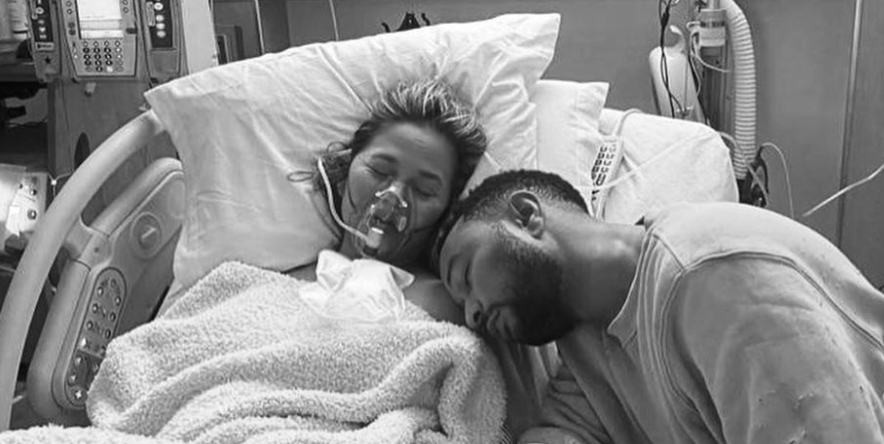Chrissy Teigen Sharing Her Pregnancy Loss Helps Women Like Me Feel Less Alone

My husband and I were watching Netflix when a push notification appeared on my phone. I gasped: Chrissy Teigen had lost her baby boy. I immediately stopped paying attention to the show, tearing up as I saw details of the placental issues, blood transfusion, epidural, and ultimately baby loss that Teigen and her husband John Legend endured—more pain than any human being should have to go through.
It’s a pain that I can relate to, and it’s pain that I, too, shared with my social media followers. Of course, Teigen is already catching flack for sharing something so private so publicly. "Why not just endure the trauma silently, stoically?" many have wondered in various comments sections across the Internet.
But I know personally just how cathartic sharing your losses can be, even with strangers. Weirdly, despite our culture’s extreme openness, miscarriage and baby loss have only recently become less taboo to talk about—and because it's so common, it’s something we need to talk about even more.
As I type this article one-handed, my 5-year-old daughter is doing Zoom kindergarten in the living room. And in my lap is my 5-month-old: my miracle baby. Over the course of two-and-a-half years, I went through three traumatic pregnancy losses back to back, as well as a chemical pregnancy, before finally making it successfully through all three trimesters to her birth.
I’d gotten pregnant easily with my older daughter, so I wasn’t emotionally prepared for the extended trauma of multiple losses. First, at 9 weeks, there was a missed miscarriage, which means the baby is no longer viable but your body doesn’t realize it. That led to a D&C operation at a surgery center to remove the fetus. They were able to test the DNA: a daughter.
Next, there was a natural miscarriage at six weeks, the embryo slipping from my body in the bathroom of a movie theater. After six months of testing, specialists, blood draws, ultrasounds, vitamins, and fertility conversations, I received a green light to try again. It had simply been bad luck, they said.
I immediately got pregnant with another baby, my fourth in four years. But 9 weeks later, as my husband and I sat in an ultrasound room at my doctor’s office, our hands clasped, my lips whispering prayers, we discovered that I’d had yet another missed miscarriage: the most traumatic by far.
After a conversation with my doctor, I elected for misoprostol pills to expel the fetus in the privacy of my home, spending that evening hunched over in pain, alternating between the bathroom and a distracting The Americans marathon on the couch. The pills didn’t “take,” and so I needed another D&C a full five weeks later, which I elected for same day, in-office at UCLA, without anesthesia. I simply wanted the pain gone and the nightmare over. They tested the tissue. Another daughter. A lifetime, erased.
But finally, a happy ending: after a full year of secondary infertility following the third baby loss, I got pregnant for the fifth time. (Well, sixth, if you count the chemical pregnancy.) That pregnancy was perfect. Textbook. Not a single issue, other than the incessant, gnawing terror that plagued me at all hours, worried for my baby’s wellbeing.
I enthusiastically liked and commented on other people’s pregnancy announcements, but I uncharacteristically kept my own pregnancy under wraps until I was 36 weeks along, out of pure fear of jinxing it. After all, I’d taken friends and followers along on each stage of my journey with previous babies, even posting a photo from UCLA immediately post D&C, desperately wanting to feel less alone.
When I finally revealed the good news on my Instagram—my belly enormous, my 5-year-old proudly grinning—it was my most-liked and commented-upon post ever: people I didn’t even know were flooding my account with ecstatic well wishes and grateful prayers and telling me how they’d been rooting for our eventual baby success, because it gave them hope for themselves, too.
A post shared by Nadine Jolie Courtney (@nadinejoliecourtney) on Mar 25, 2020 at 5:57pm PDT
People who have been through the miscarriage and stillbirth trenches know that it’s like being in the saddest secret society—something nobody wants to be a member of. But it bonds you to others who have been through the grief, too. The losses change you forever.
And in those darkest moments, when you’re trying to dig yourself out of the bottomless pit of existential despair, it genuinely helps to connect with others—even strangers —who can relate. You already feel so alone. Sharing your pain lightens the load.
Like many grieving parents, Teigen and Legend named their baby: Jack. At the advice of my OB, mine had names, too: August, Hope, Ella Rose.
And finally, my beautiful, incredible, miracle baby, a dream made real. Her name is Charlotte. She’s 5 months old. And she wouldn't be here if we hadn’t walked that hard road.
My heart aches for Teigen and Legend, but I applaud them for bravely sharing their story. People saying they shouldn’t be sharing are missing the point. They’ve already helped countless other grieving people realize that they’re not the only ones to experience such a horrifying loss. And I wish them every happiness in the future, private and public—social media trolls and armchair quarterbacks be damned.
For more stories like this, sign up for our newsletter.
You Might Also Like

